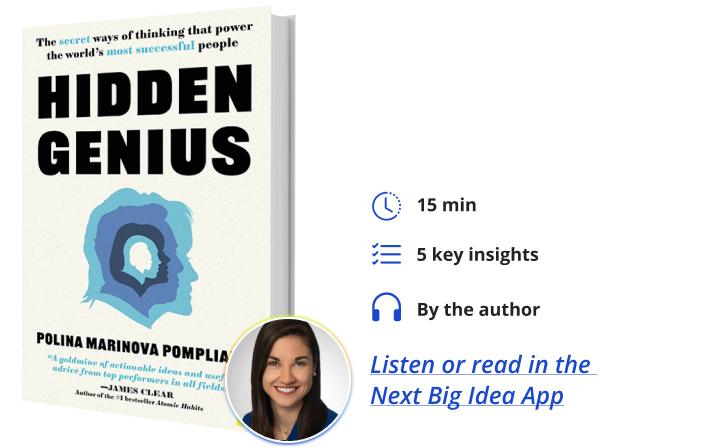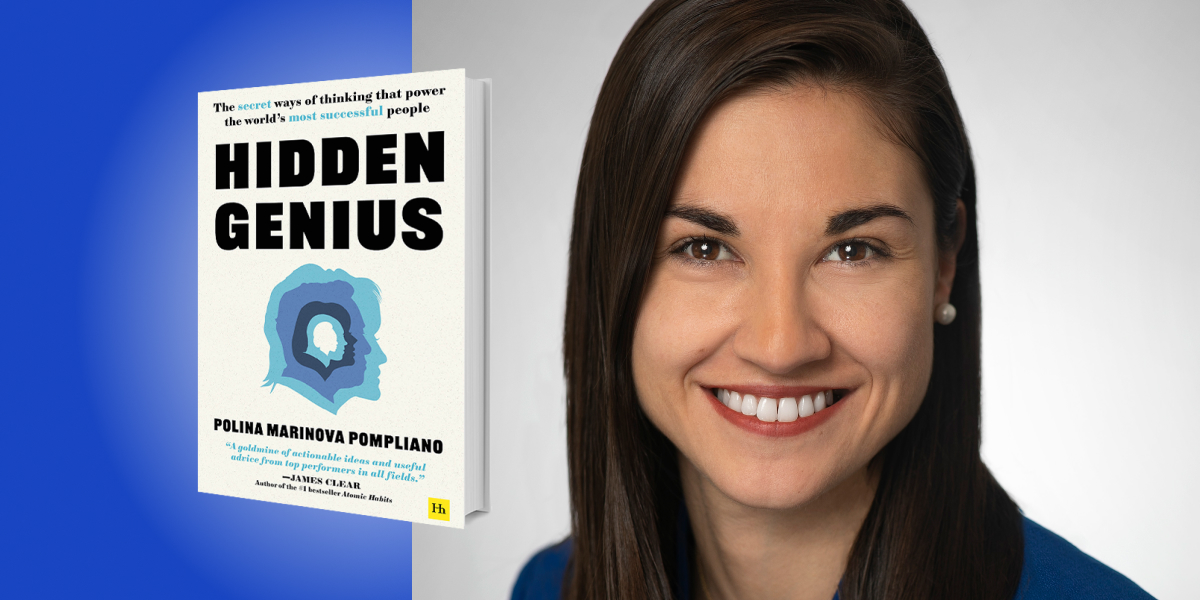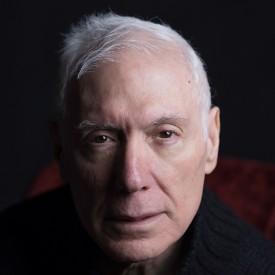Polina Marinova Pompliano is the founder of The Profile, a new media company that features long-form profiles of successful people and companies each week. Previously, she spent five years at Fortune where she wrote more than 1,300 articles and earned the trust of prominent investors and entrepreneurs. As the author and editor of Term Sheet, Fortune’s industry-leading dealmaking newsletter, Polina interviewed the industry’s most influential dealmakers, including Melinda Gates, Steve Case, Chamath Palihapitiya, Alexis Ohanian, and more.
Below, Polina shares 5 key insights from her new book, Hidden Genius: The secret ways of thinking that power the world’s most successful people. Listen to the audio version—read by Polina herself—in the Next Big Idea App.

1. Manufacturing hardship is key to developing lasting mental toughness.
The definition of mental toughness varies depending on whom you ask, but one commonality is that it’s the ability to endure. Enduring pain, discomfort, and uncertainty for long periods of time doesn’t happen by accident. It happens when you regularly stress-test yourself by intentionally introducing hardship into your everyday life.
A former Navy SEAL, David Goggins was in his early 20s, suffering from asthma, a learning disability, a stutter, and crushingly low self-esteem. He confronted these insecurities for the first time when he signed up for the Badwater 135, a race that requires participants to run 135 miles in 24 hours in the peak heat of Death Valley. To qualify, Goggins had to run a 100-mile race in San Diego, even though he had never run long distance before. The result? Goggins peed blood, nearly passed out, broke the bones in his feet, and endured stress fractures—but he finished the race. This race taught Goggins that he needed to develop mental tools to endure pain.
His first tool came from the Navy; he dubbed it “The 40 Percent Rule.” The rule is the reason why even though most people hit a wall at mile 20 during a marathon, they’re still able to finish. It’s simple: when your mind is telling you that you’re done, that you’re exhausted, that you cannot possibly go any further, you’re probably only actually 40 percent done. “A lot of cars have governors on them at, let’s say, 91 miles an hour,” explains Goggins. “It may only go 91 miles an hour because the governor stops it from going 130. We do the same thing to our brains. When we get uncomfortable, our brain gives us a way out, usually quitting or taking the easier route.”
“Choosing the path of most resistance builds authentic confidence and lasting mental resilience.”
The second tool Goggins used was what he calls the “accountability mirror,” a way of undergoing controlled emotional pain. When Goggins decided to become a Navy SEAL, he looked at his reflection and said, “You’re fat, you’re lazy, and you’re a liar. What are you going to do about it?” This sounds harsh, but Goggins says that he needed to face his insecurities in order to overcome them. The second half of that statement, the focus on remedies, made it something more than self-criticism. He pasted sticky notes around the outside of the mirror outlining the steps he needed to take to achieve his goals. They would say things like, “Go one day without lying for external validation” or “Go on a two-mile run.”
The third tool he used was deciding to do something that sucks every single day, because suffering begets growth and often, that means acting against your first instinct. It’s pouring rain outside, go for a run anyway. Your house is a mess but you’re tired? Clean it anyway. This way of thinking puts you on the offensive, gets you out of laziness and comfortable routines. Choosing the path of most resistance builds authentic confidence and lasting mental resilience.
2. Love is not just a feeling; it’s a skill that needs to be sharpened regularly.
Relationships play a key role in nearly every aspect of our lives, whether it’s our spouse, our child, our parents, or our business partner. We’re all entangled in a web of human connection. Psychologist John Gottman has spent more than 40 years studying divorce prediction and marital stability. He’s researched all sorts of relationships over the decades and has used applied mathematics to create what he calls “love equations.” From the data he gathered, Gottman separated the couples into two major groups: the masters and the disasters.
The first strategy he has developed is to make sure that your relationship follows the Five-to-One ratio. Here’s the crazy thing about any relationship in life: it’s the mundane moments that determine its health and longevity. One of Gottman’s most concrete findings is that happier couples had a ratio of five positive interactions to every negative interaction. The interactions don’t have to be grand gestures, “A smile, a head nod, even just grunting to show you’re listening to your partner, those are all positive.”
The second strategy, Gottman says, can distinguish between the relationship masters and the relationship disasters, based on whether couples answer each other’s “bids.” He refers to “bids” as the random requests for connection that partners make throughout the day. Say that your partner is a bird enthusiast and notices a really interesting-looking bird in a nearby tree. He might urge you to look by saying, “Look at that bird!” Even though it may sound trivial, your partner is requesting a response, or making “a bid for emotional connection.” Happy couples acknowledge and respond to each other’s bids even if it’s just for a quick moment. Gottman believes in the motto: “Small things often are so much more important than big things occasionally.”
“Don’t worry, even happy couples have ugly screaming matches and stonewall each other.”
The final strategy, Gottman says, is that the skill of repairment is crucial in the formation of a long-lasting relationship. What if you just had a big blowout fight? Is it too late? Don’t worry, even happy couples have ugly screaming matches and stonewall each other. They do many of the same things unhealthy couples do, but at some point, they have a conversation where they recover from the argument. Gottman describes a repair attempt as “any statement or action, silly or otherwise, that prevents negativity from escalating out of control.” It could be anything from a smile, to taking a break, to asking for clarity.
In other words, building skills around communication, trust, and conflict resolution are the key to a happy partnership. So that’s the dirty little secret about all relationships: it’s important to remember that love is not just an emotion, it’s a skill, one that has to be sharpened regularly.
3. Audit the information that you put into your brain.
This concept is simple but overlooked: What you eat is who you are, and what you read is who you become. While most of us are willing to invest in our health, we often neglect our “content diet,” the information we feed our brains on a daily basis. It’s easy to fall into a spiral of consuming junk food content, sensationalist articles, and social media posts that plunge you into destructive thought patterns. So can we inch toward leading healthier lives by optimizing what our bodies and our brains ingest? Start with conducting an honest audit of your content consumption.
In 2019, I made a conscious decision to elevate the information I was consuming, and it had a tremendous effect on my mental state. First, I conducted a content audit: I took an honest look at the content I consumed on a daily basis. What do I read? What do I watch? What do I listen to? Who do I hang out with? Then, I made a few rules: I would read fewer surface-level news articles and more long-form profiles, I would watch less reality TV and more documentaries, and I would limit my conversations to 10 percent small talk and 90 percent substance.
Finally came the practical part. I deleted a few social media apps from my phone and I stopped mindlessly scrolling. I used Pocket and Notion to save interesting articles, podcasts, and video interviews I wanted to watch, and I joined communities and engaged with people who enjoyed brainstorming and debating new ideas. I listened to high-quality podcasts during my runs and I launched The Profile Dossier, a weekly deep-dive that allowed me to take a closer look at a person whose life path I found interesting. Finally, I started conducting interviews to have more compelling conversations. If you go about your day without a content strategy, you run the risk of falling into an echo chamber full of one-sided opinions. When it comes to your brain, you need to get off autopilot.
4. You are at your most powerful when you tie your identity to your own name.
When you’re asked the question, “So, what do you do,” how do you respond? You likely respond with your most impressive identity which, for many people, is their job title. For five years, my primary identity was “Polina Marinova, writer and editor at Fortune magazine.” However, that meant I wasn’t in control of my identity and if I ever got fired or laid off, I was at risk of losing my entire self-worth, and losing that is a recipe for psychological disaster.
“We are scared to bet on ourselves.”
The best thing I did for myself is start writing my newsletter The Profile in 2017. It gave me another identity, one that allowed me to be fully myself. It would be the identity that I would eventually choose to embody full-time. Once we’ve reached a certain level of success, we get comfortable and complacent, we wrap our identities around jobs, relationships, and material possessions, all things we could lose. Over time, we begin to trust ourselves less, and leave our destinies in other people’s hands. It’s the one thing preventing us from unlocking our own hidden genius: We are scared to bet on ourselves.
One key element to betting on yourself is giving yourself permission to fail, knowing that you have the skills necessary to course-correct. MMA heavyweight champion Francis Ngannou, whose winding life journey left me speechless, once said, “I know that if I fail, I can start over and over and over and over. I have that skill, and you can take everything from me, but you cannot take that.” So, remember, there is no bad time to bet on yourself. Start a newsletter, a passion project, or a new venture that lets you tie your identity to something that actually matters—your own name. Nothing is more liberating. As a wise philosopher named Beyoncé once said, “I don’t like to gamble, but if there is one thing I’m willing to bet on, it’s myself.”
5. Success is personal and ever-changing.
I once asked myself, “How do I define success?” This question changed the trajectory of my life. In January 2020, I was riding the subway home from my job at Fortune when I read this Anna Quindlen quote: “If your success is not on your own terms, if it looks good to the world but does not feel good in your heart, it is not success at all.” The truth was that I didn’t feel successful on my own terms. I still saw success as a measure of status, money, and achievement. I didn’t realize that the universal hidden genius across many of the exceptional people I had studied was this: Success is personal.
Comedian Jerry Seinfeld describes success as the endless process of tinkering until you get as close as you can to perfection: “Solitude and precision, refining a tiny thing for the sake of it.” Melinda Gates, on the other hand, says her definition of success was shaped by this Ralph Waldo Emerson quote: “To know even one life has breathed easier because you have lived. This is to have succeeded.” In her case, as one of the richest women on the planet, she’s used her capital to back global health initiatives and support female-led businesses.
For actor Matthew McConaughey, success looks entirely different. For him, it’s the measurement of five things: fatherhood, friendships, career, being a good husband, and the state of his mind, body, and spirit. After studying and interviewing so many remarkable figures, I don’t envy or hero-worship any of them. I have seen that success doesn’t exist in a vacuum, people are dealing with family drama, money problems, insecurities, and all sorts of human messiness on a daily basis. So, how do you define success?
To listen to the audio version read by author Polina Marinova Pompliano, download the Next Big Idea App today:
































